MAPFRE's Take on How to Be a Data-driven Company
The importance of Data in this ever-changing world. Ubaldo González, CDO at MAPFRE Spain and Mark Toye, Head of Data at NTT DATA Insurance EMEAL, have a deep dive into what role plays a Chief Data Officer in the current Insurance Industry, what are the challenges and enablers to become a Data Driven Company and how to transform the business to become the partner of our costumer.
Speakers
Transcription
Welcome to the NTT DATA Insurance Dialogs. Today I have with me Ubaldo Gonzalez CDO from MAPFRE, Spain. Welcome, Ubaldo.
Thank you for having me. It's a pleasure.
Today we'd like to talk about data-driven insurance. So, if you could give us a view of your thoughts on what data-driven insurance means in the modern era?
Well, that's maybe the most important question for any CDO working in the insurance industry.
In my mind, a data-driven insurance company has already sophisticated and optimized all the products, services, and processes by leveraging data smartly to make always the best decision. That’s easy to say but very difficult to achieve. Let me share 2 examples.
From a process standpoint, let's think, for instance, about modern claim opening. In a traditional approach, as a customer, you have to fill out a long form with many questions, with many data. Then the process stops for days. You need to wait maybe one week until the expert makes the report. If you apply a data-driven approach, the claim of a process is done in 10 seconds. You can interact with an intelligent chatbot. You only have to upload a photo and then the computer vision algorithm is in charge of everything. Besides that, the insurance company can in real-time identify if the claim is covered or not. If there is potential fraud or not. Even to define the optimal process and what I mean by optimal process, you find the best Body Shop, the right value proposition, maybe pick-up and delivery courtesy car, and also the optimal routine. So, as you can see, the approach is completely different.
If we talk about the product, let's think about a health product. In a traditional approach, as an insurer, you are a payer. Once the customer is sick or injured, you only pay the cost of the claim, but in a data-driven approach you are a partner, not only a payer, but you are also a partner. What does it mean?
You can lunch a preventive program to help them to understand potential illnesses in the future. You can recommend the optimal medical test and the optimal medical treatment. So again, the value proposition for the customer is completely different. Both are different and I think only the companies that can deliver this data-driven approach will be set apart from the competitors.
This is hard because if you want to deliver those data-driven processes, products, and services, you need the right data. In the right moment, with the right quality in the right format, and that's difficult.
You have to deliver and build strong data foundations. That's why I think when we talk about data-driven, we shouldn't focus only on the use cases, but also on how you are going to deliver those use cases to maximize the return on investment.
You mentioned you start touching on the challenges of becoming data-driven. So for a modern insurer, what are those key enablers and challenges that you need to get right to be truly data-driven?
I'm biased because of my current position as a CDO, but I think there is plenty of challenge. Let me share at least a few of them.
The first one I would highlight is tackling transition development and retention. Why? Because as an insurer we used to compete within the industry. For instance, we wanted to have, 20 years ago, the best actuaries and we had to compete with other insurance companies to attract and retain the best talent. But now this is a cross to any industry. If you want to have the best data talent you need to compete with Google, Amazon, and Spotify and that's difficult.
So, we are doing a huge effort and to be honest, is going great right now, more than 95% of our data talent is still with us, and we are working on developing a strong career path, competitive salaries, flexibility, launch an ambitious project and ambitious infrastructure to allow or data team to get the most of their potential. So this is something we are working very hard on.
A second challenge I would say is to evolve the status code together with all the stakeholders. The insurance industry is a data-intensive industry. We have always worked with data. 20 years ago, 10 years ago, we had actuaries, we had business intelligence experts. And now, yes, there is hype about data, but it's not only about appointing a CDO or building a new data office. You have to clarify how these new roles (data scientists, data engineers, data architects) are going to work with other roles like actuaries, business intelligence teams, and so on.
That's why, in my opinion, is very important to work hard all together to define a common vision, to build a common operating model, because if not, it's not going to work.
So, you're talking about the core context of data literacy across the organization.
Yeah.
So where do you see the role of the CDO in sort of encouraging that transformation across the entire business and not just in that data area to sort of build that data literacy?
Yeah, that's a very good question. And I think our role has two velocities.
The first velocity is to boost or speed up the flagships because, in the end, this is about the impact on the customer journeys and impact on the PNL of the company. So right now there are plenty of opportunities to leverage data to make a tangible impact in the short term, for instance, pricing sophistication, underwriting sophistication, and claim management with a data-driven approach. So, I think as a CDO, your first duty is to speed up those flagships to demonstrate that data has a positive ROI since the first year.
At the same time, as you said, data literacy is very important. The world has changed, the tools have changed, and the methodologies have changed.
There are new techniques, and we must upskill the teams we have to give them the environment to develop their potential, so that's why it's so important to develop a data literacy program. With training, communication, building mentoring programs, building sponsorship program, and building networks of data teams in different areas, even among different geographies.
So those velocities, short-term key flagships, but also data literacy transformation in order to facilitate the democracy of data along the whole organization are both very important and we shouldn't choose one or the other. We have to work on both at the same time.
You've been a successful CDO for a number of years now, but you've painted a very broad picture of the requirements and sort of the areas of impact that you need to have as a successful CDO in a large organization and a large insurer. So what skills do you see as essential to being a CDO in the modern age?
Well, from my side, there is room for improvement. I have to learn many things so I'm still learning. As I said before, I'm biased because currently I'm a CDO, but I think it's a very demanding position. Why? Several reasons.
The first challenge is that it is a new position. That means that many of your colleagues don't know at the beginning what you do, so you have to work with all of them to explain what the mission of the CDO is, how you can add value to their business goals, and so on. The second challenge is that the expectations are very, very high. Everyone is talking about data. Everyone is waiting for that data to solve all the problems.
And then as a CDO, your exposition is huge because as I always said. Data is everywhere, so you have to work with all your colleagues. All the areas are working with data and as a CDO, if you want to boost the data strategy of the company you have to work with your colleagues, your team, the management committee, with the CEO. All these things make the position very demanding.
In my opinion, the perfect CDO is a perfect balance among four categories:
The first one is business, and if I may, I think many CDOs don't have enough business knowledge and it's very, very important. I think as a CDO you have to perfectly understand the business model and the value chain of your company. It's the only way to be a true advisor to your business partners.
The second level is technology. It's completely impossible to isolate data from technology, so even if data is not only technology, you have to understand the current technological landscape related to data and even related to software in general, because that's the only way to find the opportunities and to find how you can deliver those use cases that business needs.
The third category is data itself and data is very wide. You have to understand concepts related to data architecture, data governance, data engineering, to data science. Somehow you know about everything, but you are not an expert in anything. But this is the role of the CDO.
And the last driver or the last enabler, in my opinion, is people, because as I said before, your level of exposition is huge. You have to work with your team, with your peers, with the management committee, etcetera. So you have to develop people-related skills such as emotional intelligence, resilience, and empathy... As you see, it's a very transversal role.
In my opinion, it's a very demanding role, but it's also a very nice role, but just I believe the opportunities related to data are huge and the future of any industry, also insurance, is based on data. So I'm lucky of being the chief data officer of my firm.
Absolutely. You mentioned that obviously, you got a wide range of stakeholders. So we've got business through to your data colleagues and a dependency on technology. There's a trend in the modern era that requires everything to give an instant return on investment. So everybody's looking for quick wins. But as you sort of articulated, there were technical challenges, making sure you have your integration and your data available such that you can actually drive this data-driven decision-making process for your customers and respond quickly. So how do you balance the need for long-term investment in data and technology enablers with the need for quick wins for the business?
That's a very, very relevant question. In my opinion, it's a key success factor in any data and artificial intelligence transformational program.
I think again there are three key insights:
For the first one, you have to leverage a use case-driven approach. What does it mean? In my opinion, you only have to focus on use cases with an impact on the return of investment. Then the data foundational capabilities that you need have to be developed within those use cases.
I have seen how many companies have made a huge investment to develop a Data Lake, but the Data Lake is a mean, it's not an end by itself. You can invest millions to build a Data Lake without knowing why or what for. So in my opinion the first point is use case driven, find what are the use cases and the way you want to add value to the customer and the shareholders, and then deliver the use cases, building the data foundations within those use cases. For sure you need a budget to run the operations and maintain the key data asset. The priority in my opinion is to launch and build use cases.
A second important insight, in my opinion, is also to embrace agile methodology. This methodology was launched many years ago. It focused on software development, but in my opinion, it perfectly fits the data project. It's true that normally in our teams we have data scientists who are very close to academia and research and this approach of building minimum viable products, and iterating new releases is not what they used to do in academia. You have to work with them, you have to allow them to understand the methodology and what its benefits are.
Once everyone is on the same page, agile methodology is very important because you can deliver value very fast, have a tangible impact, very fast, and then iterate and improve speeding by sprint.
Agile Enterprise is required across the board. It's not just in the data space that needs to deliver an agile delivery model, and I assume you're also pointing towards the data product concept. Treating data as a product with appropriate ownership inside the business and involving the business and the data teams in the ownership creation and maintenance of those data products.
Yeah, thank you for talking about data products because for me it's the main responsibility of any CDO. I believe that as a CDO and as a data team, you must have your PNL if you want to be relevant. If you want to stay relevant within the organization, you need a PNL and it's the best way to show that what you are doing as a team, and as a company in the data field adds value to the customer and the shareholders. That's why in my mind you must select the right data product.
A data product is in my opinion a tool or an application that help businesses to optimize processes (processes, products, or services) by making the right decision. So, in my opinion, data have to find the right data product, by talking with businesses and with technology, launching those data products, and then leveraging the AB testing methodology. Analyse the performance of those processes or those products with data, with those data products, and without those data products. The gap is the benefit of leveraging data smartly and that's important.
As an advisory service at NTT DATA, one of the things we often see is that you can move down a data products process and then an agile implementation process with the technical and data teams. But the transformation needed by the business, hopping back to data literacy, is often the challenge, understanding and educating the business to take ownership of the data that they need to run their business, that drives value for the business. And changing the behaviour of the business to think more about data as a product is often the challenging part rather than the implementation in the technical teams. How have you approached that at MAPFRE?
Yeah, aligned with what you have said. I think there is a key role in the data product owner and it's important to involve business. I always say that the business sponsor and the business product owner must be in the spotlight.
We are the data team, but they are the owner of the product, the owner of the process, and also the sponsor of the process. So that's why we have to work very closely with them. Upskill their knowledge about data. Let them know the potential opportunity of leveraging data to improve their scope. And that's very, very important as we have said several times today.
Today there are plenty of platforms on the Internet to launch a data literacy program with a specialized program depending on your profile. Whether you are an expert, you are an analyst, or you are the chief operating officer of the company. It is important to work with all of them to embrace data, to democratize. Culture is a very relevant technical profile and I think as CDOs, as data teams, we tend to be technical profiles. We usually forget that part. That's why we are very close to HR, launching this data literacy program, changing management, and so on.
Wonderful. And just to provide some insights to the viewers. You mentioned use cases that are the primary method of driving early change and early value. Do you have any insight into what the best use cases were when MAPFRE was starting this journey?
Well, in my opinion, in the insurance industry, there are four main flagships in terms of return on investment in the short term. The first one, and I think I mentioned it before, is pricing and underwriting sophistication. We used to manage the pricing and underwriting capabilities with 10 variables and I would say simple algorithms. Today in the big data era, we can leverage more than 100 data sources and more than 1000 variables, and we can leverage much more sophisticated algorithms to improve our underwriting and pricing capabilities.
Another block I would say is claim management, we used to leverage only simple rules to define the optimal process within our claim management strategy. Today we can leverage artificial intelligence and data, as I said before, to find the optimal Body Shop, the optimal process, the right value proposition for the customer, and the right message. We can industrialize our processes with intelligent automation tools.
A third block is customer 360. All the products and projects related to customer lifetime value, cross-selling, retention, leach management, and so on.
And the last one which I have already mentioned it, is everything related to intelligent automation and efficiency. We have 7,000,000 customers here in Spain, so you can imagine our operations are huge and there are plenty of opportunities to level intelligent automation with RPA to automate and sophisticate our processes.
Having said that, I want to highlight that in the medium term the real transformation is close to product development. We shouldn't focus only on improving our current processes. But also, in changing our business model because with data we can deliver a new product and as I said before, not only be a payer of a claim but also be a partner for our customer, including much more new functionalities in our product with higher added value for customers.
Thank you very much. That's been extremely insightful Ubaldo. Thank you very much for participating in NTT DATA Insurance Dialogs.
Thank you for your time. It's a pleasure to collaborate with NTT DATA. Thank you.





